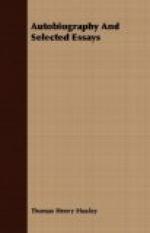At present, the most convinced believer in the aphorism “Bene qui latuit, bene vixit,"[3] is not always able to act up to it. An importunate person informs him that his portrait is about to be published and will be accompanied by a biography which the importunate person proposes to write. The sufferer knows what that means; either he undertakes to revise the “biography” or he does not. In the former case, he makes himself responsible; in the latter, he allows the publication of a mass of more or less fulsome inaccuracies for which he will be held responsible by those who are familiar with the prevalent art of self-advertisement. On the whole, it may be better to get over the “burlesque of being employed in this manner” and do the thing himself.
It was by reflections of this kind that, some years ago, I was led to write and permit the publication of the subjoined sketch.
I was born about eight o’clock in the morning on the 4th of May, 1825, at Ealing, which was, at that time, as quiet a little country village as could be found within a half-a-dozen miles of Hyde Park Corner. Now it is a suburb of London with, I believe, 30,000 inhabitants. My father was one of the masters in a large semi-public school which at one time had a high reputation. I am not aware that any portents preceded my arrival in this world, but, in my childhood, I remember hearing a traditional account of the manner in which I lost the chance of an endowment of great practical value. The windows of my mother’s room were open, in consequence of the unusual warmth of the weather. For the same reason, probably, a neighbouring beehive had swarmed, and the new colony, pitching on the window-sill, was making its way into the room when the horrified nurse shut down the sash. If that well-meaning woman had only abstained from her ill-timed interference, the swarm might have settled on my lips, and I should have been endowed with that mellifluous eloquence which, in this country, leads far more surely than worth, capacity, or honest work, to the highest places in Church and State. But the opportunity was lost, and I have been obliged to content myself through life with saying what I mean in the plainest of plain language, than which, I suppose, there is no habit more ruinous to a man’s prospects of advancement.
Why I was christened Thomas Henry I do not know; but it is a curious chance that my parents should have fixed for my usual denomination upon the name of that particular Apostle with whom I have always felt most sympathy. Physically and mentally I am the son of my mother so completely—even down to peculiar movements of the hands, which made their appearance in me as I reached the age she had when I noticed them—that I can hardly find any trace of my father in myself, except an inborn faculty for drawing, which unfortunately, in my case, has never been cultivated, a hot temper, and that amount of tenacity of purpose which unfriendly observers sometimes call obstinacy.




